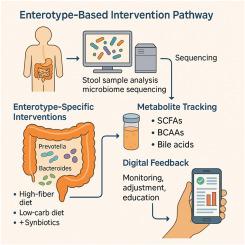Targeting gut microbial signatures to personalize obesity treatment: Integrating microbiome-based stratification into precision medicine
Q2 Medicine
引用次数: 0
Abstract
Obesity is a chronic heterogenous metabolic disease that is on the rise in low- and middle-income countries like sub-Saharan Africa, where they are experiencing an urbanisation and westernisation of the diet, transforming the nutrition environment. Although microbiome-based stratification of obesity treatment has been suggested as a global solution, there are no African-specific structures. The current communication introduces the first Africa-adapted, conceptual and evidence-informed, enterotype-based model, combining recent African microbiome data. Unique microbial signatures of the gut e.g., a greater occurrence of Succinivibria, Treponema, and Methanobrevibacter are likely to affect nutritional response patterns and responses to interventions among Africans. The four-step conceptual model includes (1) gut profiling, (2) enterotype-matched diets, (3) metabolite tracking and (4) digital feedback loops, which are enabled by culturally adapted, low-cost diagnostics (e.g., portable quantitative polymerase chain reaction (qPCR) kits, lateral-flow short-chain fatty acid (SCFA)/lipopolysaccharide (LPS) assays), and mobile health platforms. We clarified that this is a hypothesis-driven framework, conceptually informed by existing evidence but not empirically validated. A randomised controlled trial (RCT) design proposal to use permutational multivariate analysis of variance (PERMANOVA) to test microbiome composition and multivariate regression to test the diet-microbiome body mass index (BMI) association. This methodology provides solutions to some of the main translational gaps in precision obesity care by incorporating African-specific microbial data, culturally specific diets, and scalable technology.

针对肠道微生物特征个性化肥胖治疗:将基于微生物组的分层整合到精准医学中
肥胖是一种慢性异质性代谢性疾病,在撒哈拉以南非洲等低收入和中等收入国家呈上升趋势,这些国家正在经历城市化和饮食西方化,改变着营养环境。尽管以微生物组为基础的肥胖治疗分层已被认为是一种全球性的解决方案,但没有非洲特有的结构。当前的信息通报结合了最近的非洲微生物组数据,介绍了第一个适合非洲的、概念性的和基于证据的、基于肠道型的模型。肠道独特的微生物特征,如琥珀弧菌、密螺旋体和甲烷菌的大量出现,可能会影响非洲人的营养反应模式和对干预措施的反应。四步概念模型包括(1)肠道分析,(2)肠道型匹配饮食,(3)代谢物跟踪和(4)数字反馈循环,这是通过适应文化的低成本诊断(例如,便携式定量聚合酶链反应(qPCR)试剂盒,横向流动短链脂肪酸(SCFA)/脂多糖(LPS)测定)和移动健康平台实现的。我们澄清说,这是一个假设驱动的框架,由现有证据在概念上提供信息,但未经经验验证。一项随机对照试验(RCT)设计建议使用排列多变量方差分析(PERMANOVA)来测试微生物组组成,并使用多变量回归来测试饮食-微生物组体重指数(BMI)的相关性。该方法通过结合非洲特有的微生物数据、文化特有的饮食和可扩展的技术,解决了精确肥胖护理方面的一些主要转化差距。
本文章由计算机程序翻译,如有差异,请以英文原文为准。
求助全文
约1分钟内获得全文
求助全文
来源期刊

Obesity Medicine
Medicine-Public Health, Environmental and Occupational Health
CiteScore
5.50
自引率
0.00%
发文量
74
审稿时长
40 days
期刊介绍:
The official journal of the Shanghai Diabetes Institute Obesity is a disease of increasing global prevalence with serious effects on both the individual and society. Obesity Medicine focusses on health and disease, relating to the very broad spectrum of research in and impacting on humans. It is an interdisciplinary journal that addresses mechanisms of disease, epidemiology and co-morbidities. Obesity Medicine encompasses medical, societal, socioeconomic as well as preventive aspects of obesity and is aimed at researchers, practitioners and educators alike.
 求助内容:
求助内容: 应助结果提醒方式:
应助结果提醒方式:


